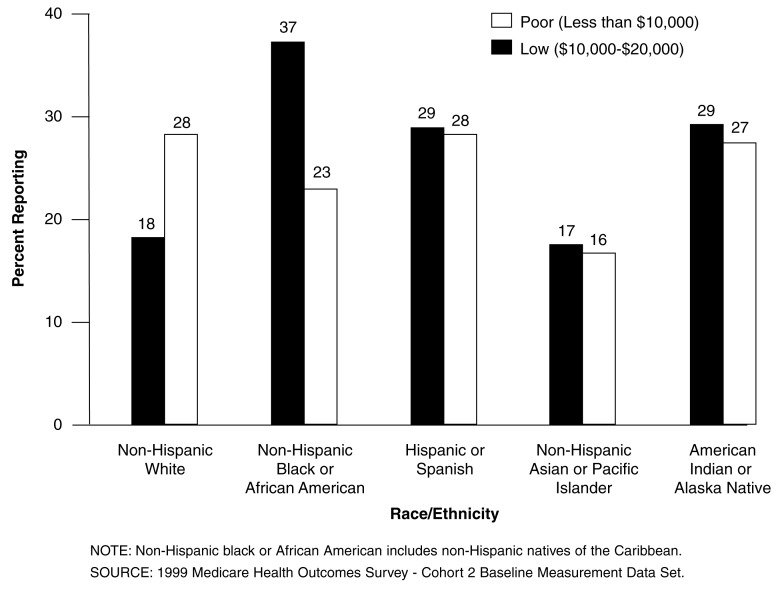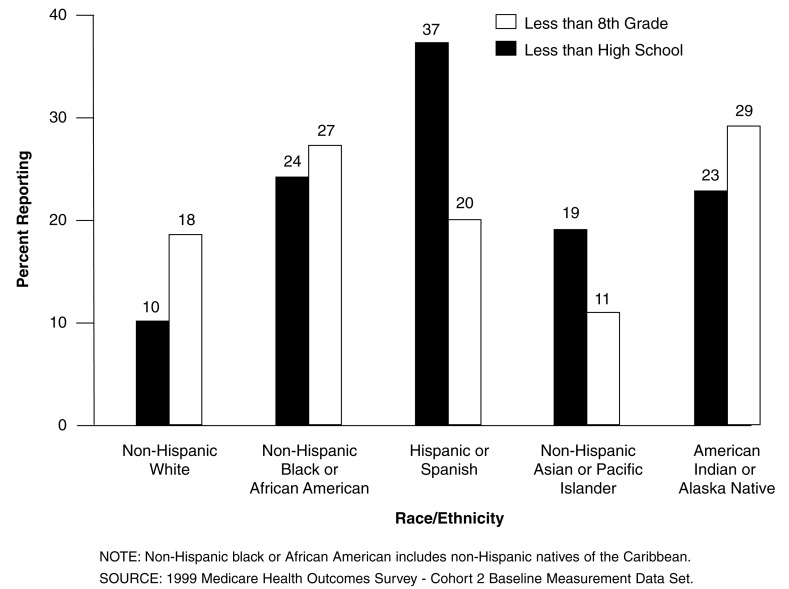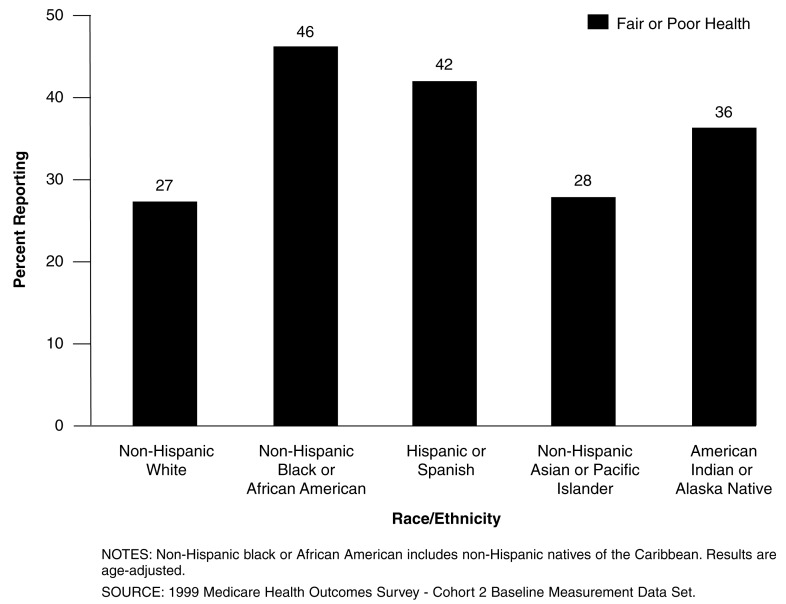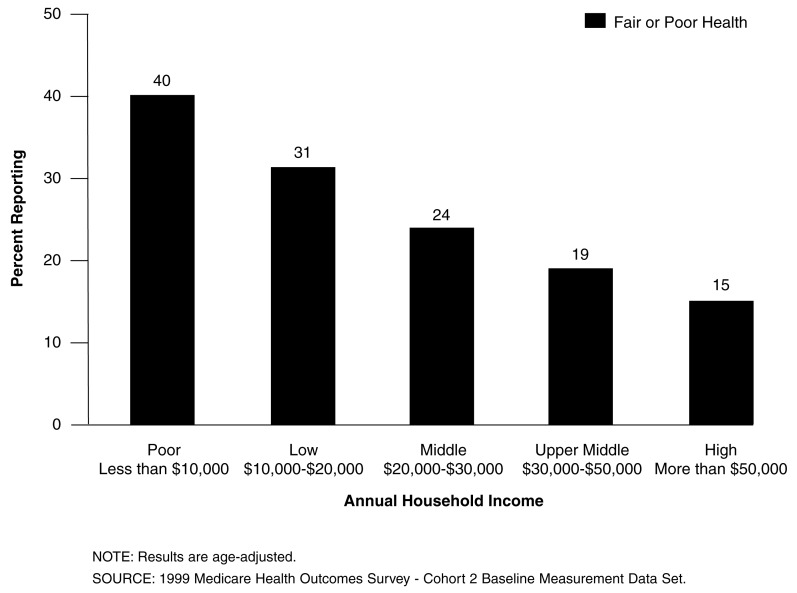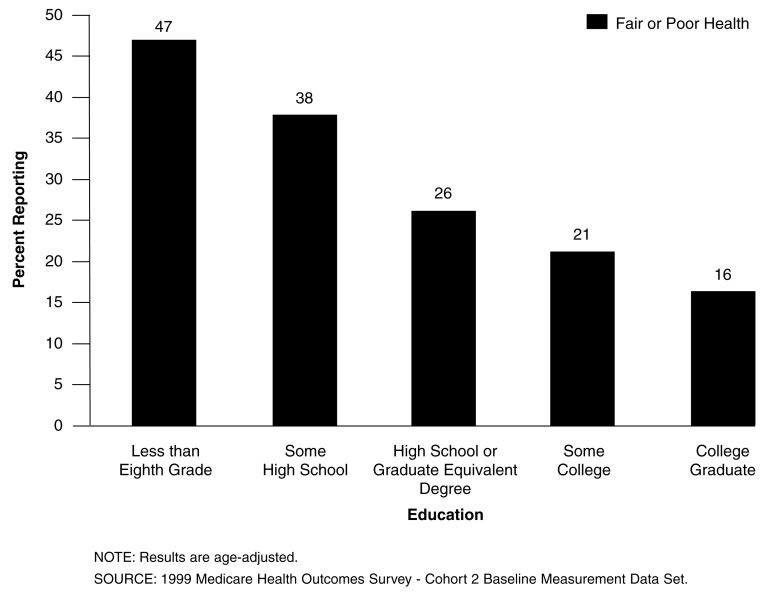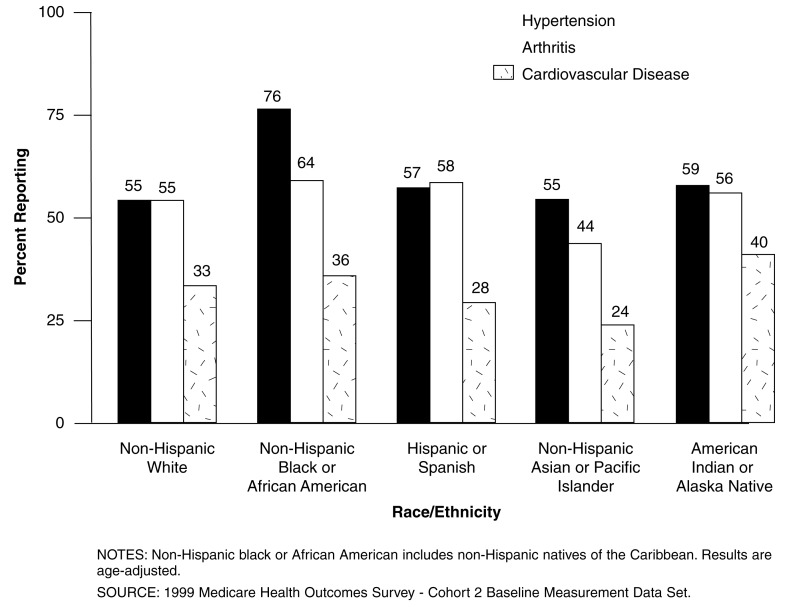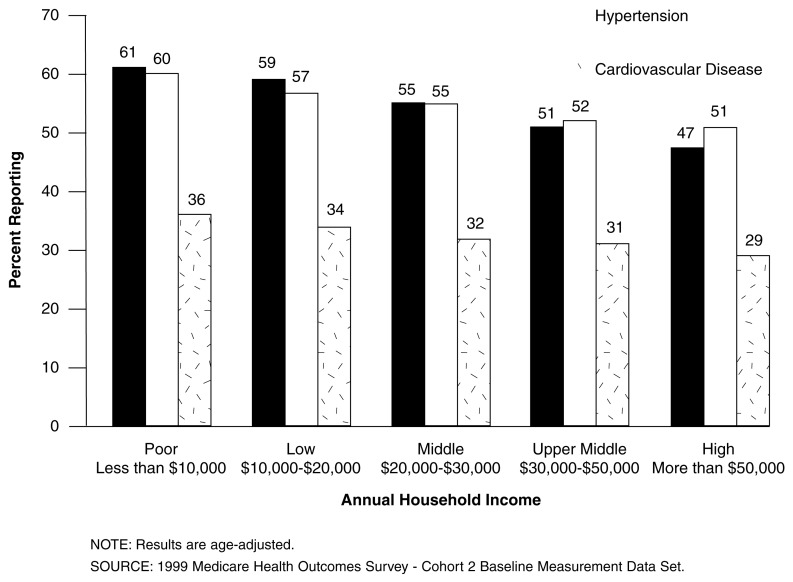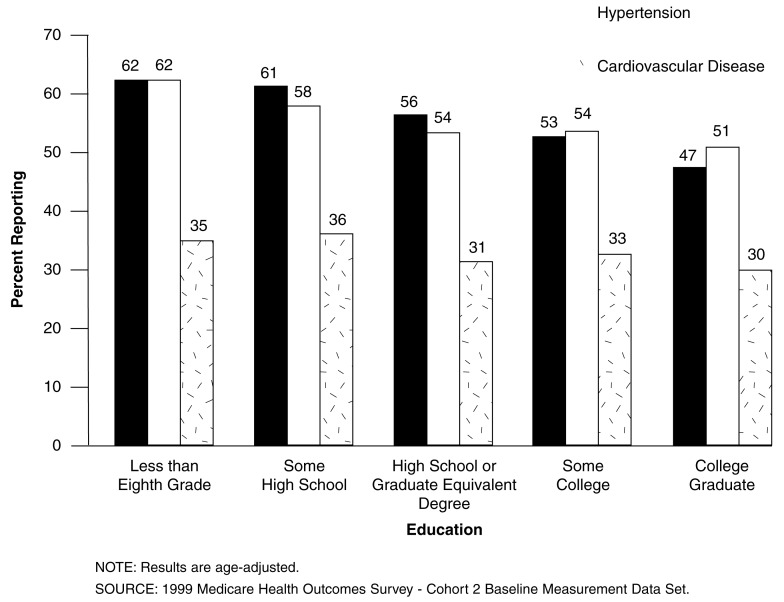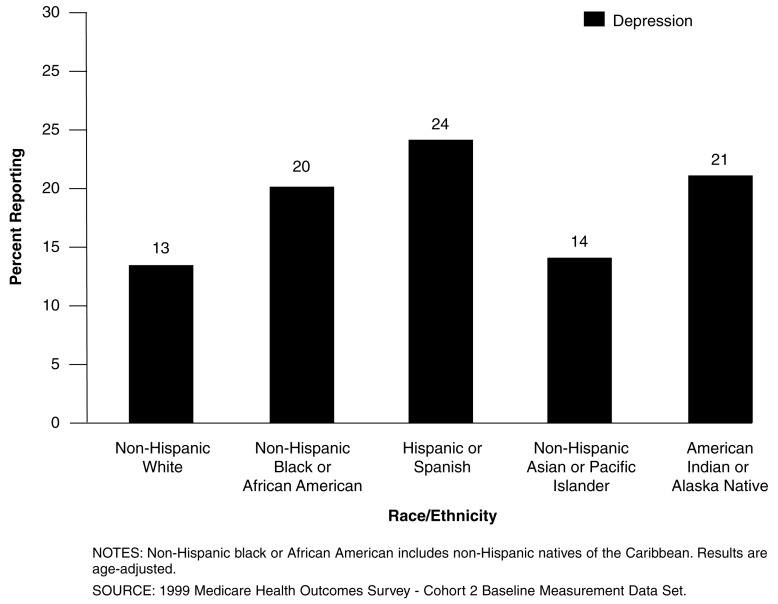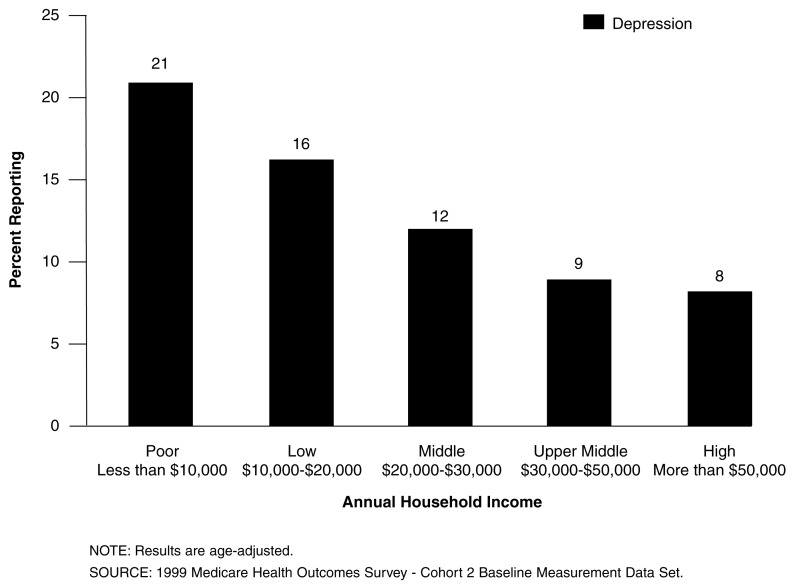Introduction
The Medicare Health Outcomes Survey (HOS) provides comprehensive information about the health and functional status of Medicare beneficiaries enrolled in Medicare managed care organizations. The survey's core instrument contains items for assessing physical and mental health status, activities of daily living, clinical case mix adjustment variables, chronic conditions, and demographic information (National Committee for Quality Assurance, 2000). The data are collected through mail administration of the survey with telephone followup. Results from the HOS will be used to guide quality improvement activity in health plans, improve CMS's ability to monitor health plan performance, and provide comparative information to beneficiaries to use when making health plan choices (Stevic et al., 2000; Cooper et al., 2001). The following figures are based on the responses of 91,314 community-dwelling women age 65 or over enrolled in managed care who participated in the 1999 Medicare HOS Cohort 2 Baseline Survey.
Differences in income, education, and health status were noted among the five racial/ethnic groups surveyed (non-Hispanic white, non-Hispanic black/African American,1 Hispanic/Spanish, non-Hispanic Asian/Pacific Islander, and American Indian/Alaska Native). Among community- dwelling women age 65 or over, those individuals with less education and lower incomes are more likely to report fair or poor health, experience a higher burden of chronic illness, and to indicate that they felt depressed or sad much of the time in the past year.
Future research should focus on understanding the interrelationships between socioeconomic status, race/ethnicity and health, and functional status to identify effective strategies for maximizing health and functional status among all subgroups of older women.
Figure 1. Ethnic Differences in Annual Income Among Women Age 65 or Over Enrolled in Medicare Managed Care.
- Non-Hispanic black/African American women are more likely to report annual household incomes less than $10,000.
- Over one-half of non-Hispanic Black/African American, Hispanic/Spanish, and American Indian/Alaskan Native women age 65 or over report annual household incomes less than $20,000.
- Non-Hispanic Asian/Pacific Islander women enrolled in Medicare managed care are least likely to report lower incomes.
- Nearly one-half of Non-Hispanic white women age 65 or over also report low incomes.
Figure 2. Ethnic Differences in Level of Education Among Women Age 65 or Over Enrolled in Medicare Managed Care.
- Over one-half of non-Hispanic black/African American, Hispanic/Spanish, and American Indian/Alaskan Native women age 65 or over report less than a high school education.
- Over one-third of Hispanic/Spanish women age 65 or over enrolled in Medicare managed care report having an eighth grade education or less.
- One of every four non-Hispanic white women age 65 or over reports less than a high school education.
Figure 3. Ethnic Differences in the Proportion of Women Age 65 or Over Enrolled in Medicare Managed Care Reporting Fair or Poor Health.
- Overall slightly greater than one-quarter of all women in the survey reported being in fair or poor health.
- The proportion of women reporting fair or poor health varies significantly across the racial and ethnic groups identified in the survey.
- Non-Hispanic black/African American women are most likely to report fair or poor health.
- Non-Hispanic white and Non-Hispanic Asian/Pacific Islander women enrolled in Medicare managed care are least likely to report fair or poor health.
Figure 4. Proportion of Women Age 65 or Over Enrolled in Medicare Managed Care Reporting Fair or Poor Health, by Annual Income.
- The proportion of women reporting that they are in fair or poor health declines with each increase in income level.
- Women reporting annual household incomes of less than $10,000 are more than twice as likely to report fair or poor health compared with women reporting annual household incomes of more than $50,000.
Figure 5. Proportion of Women Age 65 or Over Enrolled in Medicare Managed Care Reporting Fair or Poor Health, by Level of Education.
- Nearly one-half of respondents with an eighth grade education or less report that they are in fair or poor health. These women are nearly three times most likely to report that they are in fair or poor health than women who are college graduates.
- For each increase in level of education there is a decline in the proportion of women reporting that they are in fair or poor health.
- Women who report having attended some college are more likely to report that they are in fair or poor health then those who are college graduates.
Figure 6. Ethnic Differences in Self-Reported Prevalence of Common Chronic Conditions Among Women Age 65 or Over Enrolled in Medicare Managed Care.
- HOS data illustrate the high burden of chronic illness experienced by older women.
- Hypertension and arthritis are the two most common chronic conditions reported by older women in the survey. Over one-half of all women report having at least one of these conditions.
- Three of every four Non-Hispanic black/African American women report that a doctor has told them that they have high blood pressure or hypertension.
- Women of American Indian/Alaskan Native descent are most likely to report having been told by their doctor that they have cardiovascular disease.
Figure 7. Self-Reported Prevalence of Chronic Conditions Among Women Age 65 or Over Enrolled in Medicare Managed Care, by Annual Income.
- Lower income respondents report a significantly higher illness burden than their more affluent counterparts.
- Hypertension and arthritis are the two most common chronic conditions reported by older women in the survey irrespective of income.
- Over 60 percent of women who reported an annual income of less than $10,000 indicate that a doctor has told them that they have high blood pressure or hypertension. The proportion of women reporting this condition declines for each increase in income category.
- A similar pattern is observed for arthritis and cardiovascular disease across income categories.
Figure 8. Self-Reported Prevalence of Chronic Conditions Among Women Age 65 or Over Enrolled in Medicare Managed Care, by Level of Education.
- Respondents with a lower level of education report a significantly higher illness burden than respondents with higher levels of education.
- Over 60 percent of women who reported less than a high school education indicate that a doctor has told them that they have high blood pressure or hypertension. The proportion of women reporting this condition declines for each increase in educational level.
- Sixty-two percent of women with an eighth grade education or less report having arthritis compared with 51 percent of women who have graduated from college.
- Women with less than a high school education are more likely to report having cardiovascular disease than women who have graduated from high school.
Figure 9. Ethnic Differences in the Self-Reported Prevalence of Depressed Mood Among Women Age 65 or Over Enrolled in Medicare Managed Care.
- One of every seven women responded yes when asked if “In the past year, have you felt depressed or sad much of the time?”
- At least one in every five non-Hispanic black/African American, Hispanic/Spanish, and American Indian/Alaskan Native women age 65 or over report feeling depressed or sad much of the time.
Figure 10. Prevalence of Depressed Mood Among Women Age 65 or Over Enrolled in Medicare Managed Care, by Annual Income.
- Lower income respondents report a significantly higher prevalence of depressed mood than their more affluent counterparts.
- Of women who reported an annual income of less than $10,000, 21 percent indicate that they felt depressed or sad much of the time in the passed year compared with 8 percent of women with annual household incomes more than $50,000.
- Women with annual incomes in the lower-middle category report a greater prevalence of depressed mood than women in higher income categories, but lesser prevalence of depressed mood than women in lower income categories.
Footnotes
Arlene Bierman is with the Agency for Healthcare Research and Quality (AHRQ). Samuel Haffer is with the Centers for Medicare & Medicaid Services (CMS) (formerly known as the Health Care Financing Administration), and Yi-Ting Hwang is with the Georgetown University School of Medicine. The views expressed in this article are those of the authors and do not necessarily reflect those of AHRQ, CMS, or the Georgetown University School of Medicine.
Non-Hispanic black or African American includes non-Hispanic natives of the Caribbean.
Reprint Requests: Samuel C. Haffer, Ph.D., Centers for Medicare & Medicaid Services, Office of Clinical Standards and Quality, 7500 Security Boulevard, S3-02-01, Baltimore, MD 21244-1850. E-mail: hos@cms.hlis.gov
References
- Cooper JK, Kohlmann T, Michael JA, Haffer SC, et al. Health Outcomes. New Quality Measure for Medicare. International Journal for Quality in Health Care. 2001 Feb;13(1):9–16. doi: 10.1093/intqhc/13.1.9. [DOI] [PubMed] [Google Scholar]
- National Committee for Quality Assurance. HEDIS® 2000. National Committee for Quality Assurance; Washington, DC.: 2000. Specifications for the Medicare Health Outcomes Survey. [Google Scholar]
- Stevic MO, Haffer SC, Cooper JK, et al. How Healthy Are Our Seniors? Baseline Results from the Medicare Health Outcomes Survey. Journal of Clinical Outcomes Management. 2000 Aug;7(8):39–42. [Google Scholar]



